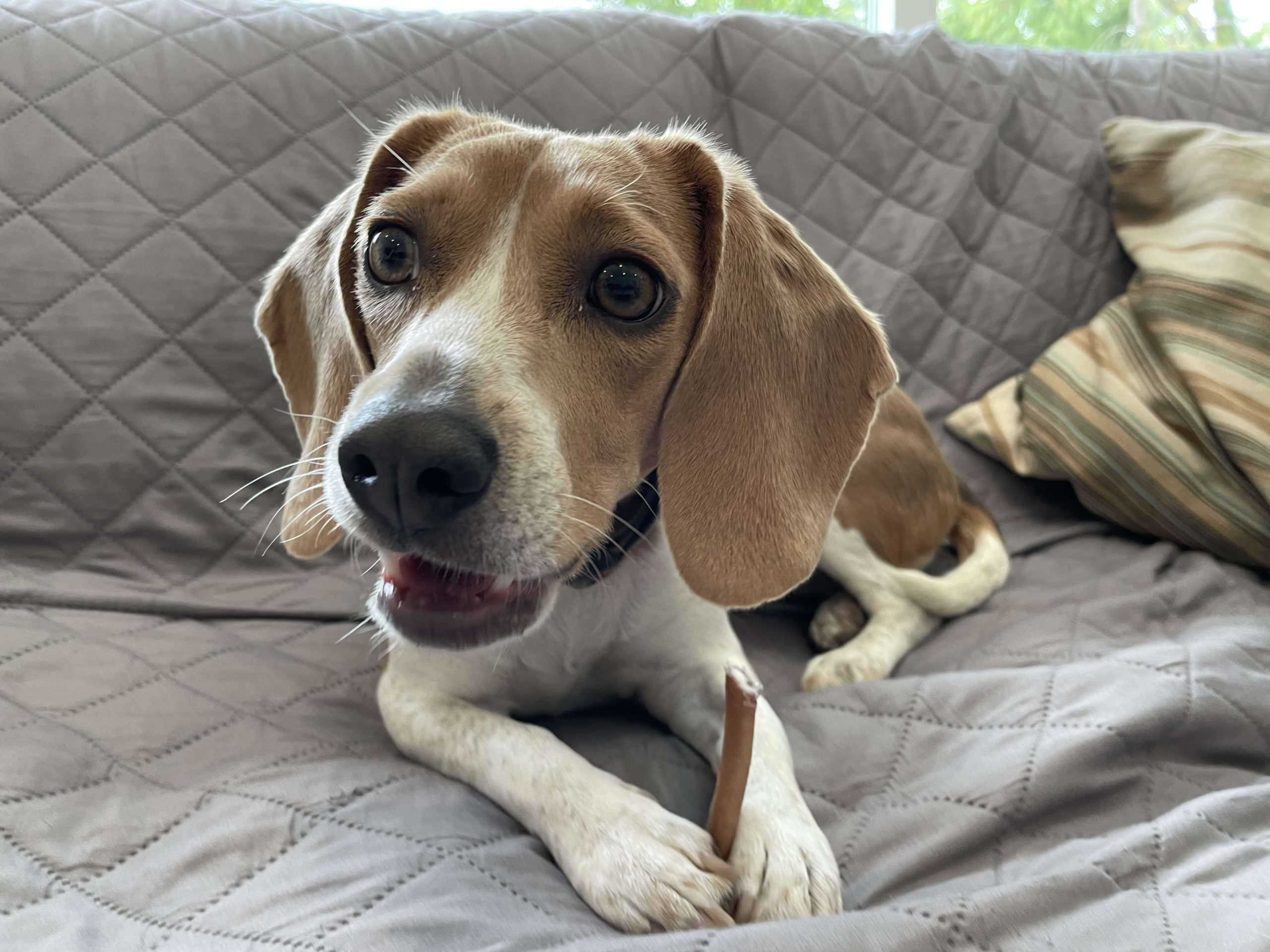Beagles, known for their adorable floppy ears and cheerful demeanor, are beloved companions for many families. However, behind their jovial appearance, these dogs can sometimes struggle with a common issue called separation anxiety. It may come as a surprise to some, but beagles are prone to experiencing separation anxiety, which can lead to distressing behaviors when left alone. Understanding this aspect of their temperament is crucial for ensuring their well-being and finding effective solutions to support them.
Separation anxiety in beagles is not a new phenomenon. As pack animals with a strong instinct to be part of a group, the history of beagles as hunting dogs has contributed to their sensitivity to being alone. This inherent characteristic, combined with their loyal and affectionate nature, makes them particularly susceptible to separation anxiety. In fact, studies show that up to 20% of beagles may exhibit signs of separation anxiety. Recognizing the signs and providing appropriate training, mental stimulation, and companionship can help alleviate their anxiety and create a more balanced and contented furry friend.
Beagles are known for being prone to separation anxiety. They form close bonds with their owners and don’t like being left alone for long periods. Separation anxiety in beagles can lead to excessive barking, destructive behavior, and other stress-related symptoms. To help ease separation anxiety, provide plenty of exercise and mental stimulation, establish a consistent routine, gradually increase alone time, and consider using calming aids or consulting with a professional dog trainer or behaviorist.

Understanding Separation Anxiety in Beagles
Beagles, with their adorable floppy ears and soulful eyes, are a popular breed of dog. Known for their friendly and outgoing nature, beagles are often considered wonderful companions. However, like any other dog breed, beagles can experience separation anxiety when left alone for extended periods.
Separation anxiety is a condition that occurs when a dog becomes excessively anxious or distressed when separated from their owners or when left alone. Beagles, being social creatures, can be especially prone to this condition. In this article, we will explore the topic of separation anxiety in beagles, its causes, symptoms, and how to manage it.
Causes of Separation Anxiety in Beagles
Separation anxiety can develop in beagles due to a variety of reasons. Some common causes include:
- Lack of socialization: Beagles are social animals that thrive on human interaction. If they are not properly socialized as puppies or do not receive enough attention and companionship, they may develop separation anxiety.
- Past trauma: Beagles that have experienced traumatic events such as being abandoned or mistreated may be more prone to separation anxiety.
- Change in routine: Dogs are creatures of habit, and any sudden change in their routine, such as a change in the owner’s schedule or a move to a new home, can trigger anxiety.
Symptoms of Separation Anxiety in Beagles
The symptoms of separation anxiety in beagles can vary from mild to severe. Some common signs to look out for include:
- Excessive barking or howling when left alone
- Destructive behavior, such as chewing furniture or digging
- House soiling, even if the beagle is house trained
- Pacing or restlessness
- Attempts to escape or break free from the confinement area
- Loss of appetite
- Excessive drooling or panting
- Depression or withdrawal
Managing Separation Anxiety in Beagles
Fortunately, there are several strategies and techniques that can help manage separation anxiety in beagles:
1. Gradual Desensitization
Gradual desensitization involves gradually exposing the beagle to the situations that trigger their anxiety. This can be done by initially leaving them alone for short periods and gradually increasing the duration over time. This helps them build up tolerance and confidence.
2. Counterconditioning
Counterconditioning involves associating positive experiences with being alone. This can be done by giving the beagle a special treat or toy whenever they are left alone. Over time, they will begin to associate being alone with something enjoyable.
3. Provide Mental Stimulation
Beagles are intelligent dogs that need mental stimulation to prevent boredom and anxiety. Providing interactive toys, puzzles, and regular exercise can help keep their minds engaged and alleviate separation anxiety.
4. Consult a Professional
If the beagle’s separation anxiety is severe or persistent, it may be beneficial to consult a professional dog trainer or behaviorist. They can provide specialized guidance and develop a customized plan to address the specific needs of the beagle.
Creating a Comforting Environment
In addition to the strategies mentioned above, creating a comforting environment for the beagle can also help manage separation anxiety:
1. Provide a Safe Space
Designate a specific area in the house as the beagle’s safe space. This can be a cozy corner with their bed, toys, and familiar scents. Having a dedicated space can help the beagle feel secure and calm.
2. Use Calming Solutions
Calming solutions such as pheromone diffusers or anxiety wraps can help create a soothing environment for the beagle. These products release synthetic pheromones that replicate the calming effects of a mother dog, helping to reduce anxiety.
3. Practice Relaxation Techniques
Teaching the beagle relaxation techniques, such as deep breathing exercises or massage, can help them relax and reduce anxiety. These techniques can be incorporated into their daily routine or used during stressful situations.
Conclusion
Separation anxiety is a common issue that can affect beagles, but with patience, training, and a comforting environment, it can be managed effectively. By understanding the causes and symptoms of separation anxiety, and implementing appropriate techniques, beagle owners can help their furry friends feel more secure and relaxed when left alone.
Table: Comparison of Beagle Separation Anxiety Management Techniques
| Technique | Description | Effectiveness |
|---|---|---|
| Gradual Desensitization | Gradually exposing the beagle to situations that trigger anxiety | Effective in building tolerance and confidence |
| Counterconditioning | Associating positive experiences with being alone | Helps the beagle to develop a positive association with being alone |
| Providing Mental Stimulation | Engaging the beagle’s mind with interactive toys and puzzles | Helps prevent boredom and anxiety |
| Consulting a Professional | Seeking guidance from a dog trainer or behaviorist | Can provide specialized advice and support |
Key Takeaways: “Do Beagles Have Separation Anxiety?”
- Beagles are prone to separation anxiety due to their strong attachment to their owners.
- Separation anxiety can lead to destructive behavior and excessive barking in beagles.
- Proper training and positive reinforcement can help manage separation anxiety in beagles.
- Creating a safe and comfortable space for your beagle when you’re away can reduce anxiety.
- Gradual desensitization to being alone can help beagles cope with separation anxiety.
Frequently Asked Questions
Beagles are known for their friendly and outgoing nature, but like any dog, they can experience separation anxiety. This condition occurs when a dog becomes stressed or anxious when left alone, leading to destructive behavior or excessive vocalization. If you’re considering getting a beagle or already have one, it’s important to understand their susceptibility to separation anxiety.
1. How can I tell if my beagle has separation anxiety?
There are several signs that your beagle may be experiencing separation anxiety. These include excessive barking or howling when left alone, destructive behavior like chewing or scratching furniture, excessive drooling, pacing or restlessness, and even attempts to escape the house or yard. If your beagle shows these signs consistently when you leave them alone, it’s likely that they have separation anxiety.
To further determine if your beagle has separation anxiety, you can try setting up a video camera to monitor their behavior when you’re not around. This can help you see if they exhibit signs of distress or anxious behavior in your absence. Additionally, consulting with a veterinarian or a professional dog trainer can provide you with further guidance and advice.
2. How can I help my beagle with separation anxiety?
If your beagle is suffering from separation anxiety, there are several techniques you can try to help alleviate their distress. Firstly, establish a consistent daily routine, including regular exercise, feeding, and playtime. This can help provide a sense of stability and predictability for your beagle.
Another approach is desensitization and counterconditioning. This involves gradually exposing your beagle to being alone for short periods of time and rewarding them for calm behavior. Start by leaving them alone for just a few minutes and gradually increase the duration. You can also provide engaging toys or treat-filled puzzles to keep them occupied when you’re away.
3. Are there any medications available to treat separation anxiety in beagles?
In some cases, medications may be prescribed to help manage separation anxiety in beagles. These medications are typically used in conjunction with behavioral training techniques and should only be administered under the guidance of a veterinarian.
Commonly prescribed medications for separation anxiety include selective serotonin reuptake inhibitors (SSRIs) and tricyclic antidepressants (TCAs). These medications can help regulate your beagle’s mood and reduce anxiety. However, it’s important to note that medication should not be seen as the sole solution and should be used in combination with behavioral interventions.
4. Can separation anxiety be prevented in beagles?
While some dogs may be more prone to separation anxiety than others, there are steps you can take to help prevent it from developing in your beagle. Early socialization and training are crucial in teaching your beagle to feel secure when alone. Gradually exposing them to different environments and people from a young age can help build their confidence and reduce the risk of separation anxiety.
Additionally, avoid creating a dependency on constant companionship. Gradually increase the time your beagle spends alone from the puppy stage, so they become accustomed to being alone for short periods. Providing them with appropriate mental and physical stimulation when you’re away can also help prevent boredom and anxiety.
5. Should I consider getting a companion for my beagle with separation anxiety?
In some cases, getting a companion for your beagle may help alleviate their separation anxiety. Another dog can provide companionship and help ease their distress when left alone. However, it’s important to consider the individual needs and compatibility of both dogs before introducing a new member to your household. Some beagles may find comfort in the presence of another dog, but for others, it may not have the desired effect.
If you’re considering getting another dog as a companion for your beagle, it’s best to consult with a veterinarian or an animal behaviorist to determine if it’s the right course of action for your specific situation.

7 Tips to Ease Separation Anxiety in Beagles
Beagles are prone to separation anxiety, which is when they become distressed when left alone.
This can result in behaviors such as excessive barking, destructive chewing, and soiling indoors.
Beagles are social dogs that thrive on companionship, so being left alone can be difficult for them.
It’s important for beagle owners to address separation anxiety through training and providing mental stimulation.
By gradually acclimating beagles to being alone and providing them with engaging activities, separation anxiety can be managed.
Overall, beagles are prone to separation anxiety, but with the right approach, this issue can be addressed.
